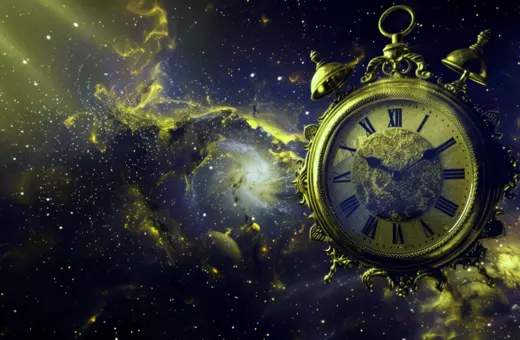Most people have heard that Einstein’s Theory of Relativity revolutionized our understanding of time. But most people still aren’t aware of quite how profound the consequences of Einstein’s block universe are, according to which our experience of the present as uniquely different from the past or the future, the very idea of time having a direction, of “passing”, is put into question, argues Michael Silberstein.
“The objective world simply is; it does not happen.” - Hermann Weyl
“I am a Tralfamadorian, seeing all time as you might see a stretch of the Rocky Mountains. All time is all time. It does not change. It does not lend itself to warnings or explanations. It simply is.” - Kurt Vonnegut
If you explore YouTube, you will find hundreds of videos and recorded lectures that assert “time is an illusion” given Einstein’s relativity. But is this true? And what exactly do these people mean by “time” and “illusion”? Because these words have multiple meanings, we must ask. My goal here is to help the reader understand in exactly what sense Einstein (or anyone else) might justifiably assert that time is an illusion based on relativity. In so doing, I argue that there are essential features of our temporal experience, such as the passage of time, presence, and direction, that cannot be fully explained in the block universe picture given to us by relativity—our best physical theory of time. And whilst these essential features of time are not themselves illusory, there is a mystery about the status in which relativity theory leaves them.
Presentism vs Eternalism
I will begin with an analogy between the experience of watching a film and our everyday experience of time (Passage, Presence, and Direction). Go back to the days of film on celluloid. Imagine you are a child who has just watched their first such film and you ask your parent, “How does it work”? Your parent takes you back to the projection booth and to your amazement, the film you watched is just a series of photographic stills each framed in black and ordered in a certain sequence. You are deeply puzzled by how these static images connect with what you just experienced. The projectionist jumps in to show you how the trick is done. You learn the film is projected at a rate of 24 frames per second, helping to create the experience of temporal passage. The film reel advances one frame, pauses for a fraction of a second, projecting the image of each individual frame when it is between the lamp and the lens, to create the sense that frame alone is happening now, and then advances to the next frame, and so on. The projector has other mechanical tricks for making the short periods of darkness between still frames, flicker effects, and its own motion undetectable.
From this, you gain an understanding of the mechanism by which a mere reel of film can be turned into an experience of a story unfolding in time. Mystery solved. You realize that the combination of the appropriately ordered frames moving through the projector creates the “illusion” that only the present moment (the single frame poised between lamp and lens) is real (exists) and that the present moment (a NOW-slice) keeps moving from past to future evolving into ever newer present moments until the end. I say “illusion”, because you now know that the movie experience of continuous temporal flow does not reflect the reality of a series of still frames moving through a projector.
___





















Join the conversation